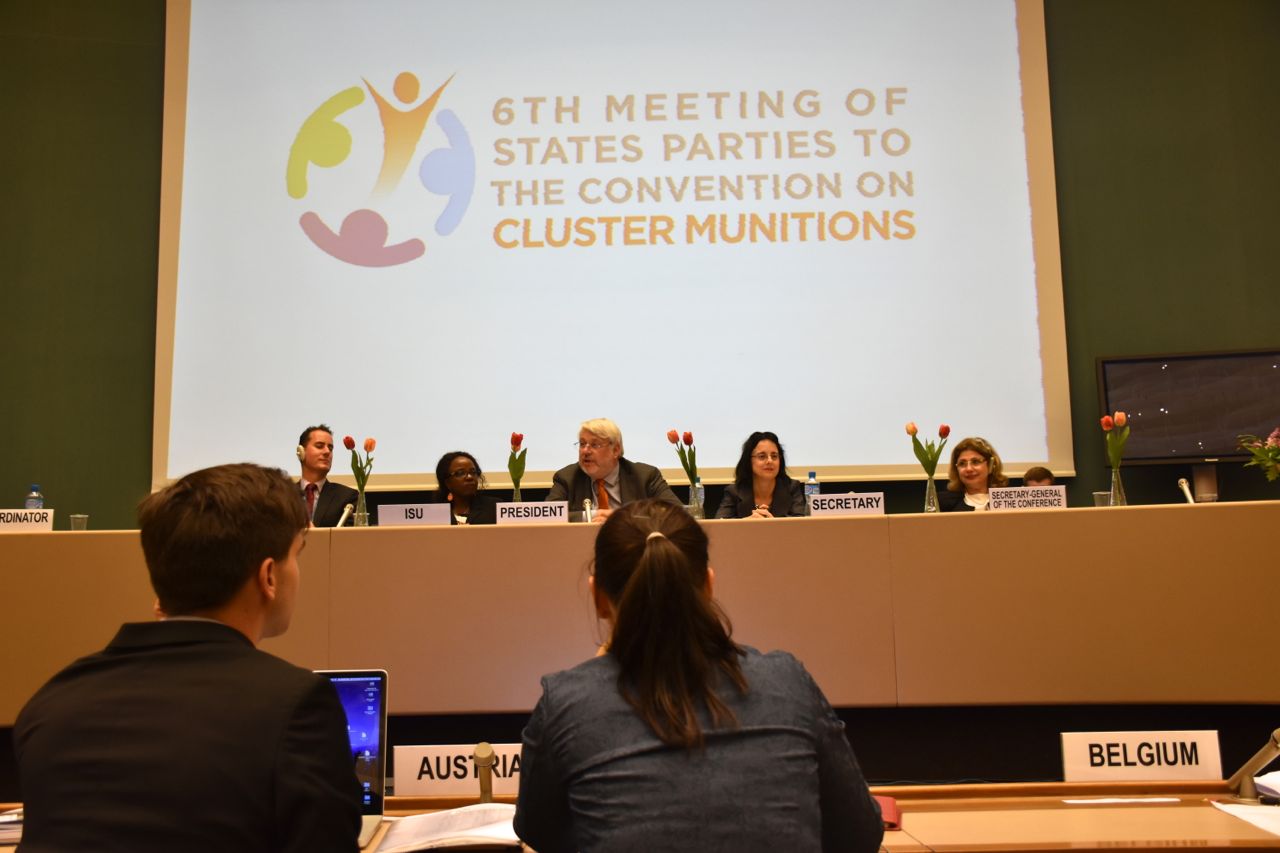
Version en française disponible pour le télécharger en pdf. ici – 09-07-2016-Press-Release-Closing-6MSP-Fr.pdf
(Geneva, 7 September 2016) – The Convention on Cluster Munitions Sixth Meeting of States Parties (6MSP) has concluded three days of sessions aimed at taking stock of progress and adherence to the Dubrovnik Action Plan which guides the treaty’s implementation efforts until 2020.
“The Netherlands is pleased with the progress achieved in matters of stockpile destruction, clearance, victim assistance and by the growing number of our membership; all these accomplishments take us one step closer towards our common goal,” said H.E. Henk Cor van der Kwast, Ambassador of the Netherlands to the Conference on Disarmament and President of the Convention.
“It is heartening to know that affected countries have started to release previously contaminated land and that there are increased efforts to assist the victims. Although there is still much work to do, I am very pleased that we have agreed on 2030 as a target date for completion.” The Convention President reiterated the need to end the use of cluster munitions in conflicts. “No State should use these indiscriminate weapons. We call upon States not party using this banned weapon, to cease further use and abide by the provisions set by this Convention.”
The Netherlands has been at the forefront of the international ambition to eliminate explosive remnants of war allocating €45 million from 2016-2020 through its Mine Action and Cluster Munitions Programme.
Universal adoption of the Convention
- There are now 119 States that have joined the Convention.
- Also welcomed, was the announcement by Madagascar and Namibia that they will soon ratify the Convention.
- While the number of States that have joined has significantly increased, meeting the 2020 target of 130 States Parties is still a challenge with 74 UN Member States still to adhere.
- Netherlands in its capacity as the Presidency sent out letters to 53 States that are not yet party with a request to join the Convention.
- Together, States not party may still hold millions of cluster munitions and submunitions.
- There has been new use of cluster munitions in two (2) States not party to the Convention, the Syrian Arab Republic and Yemen, putting once more in evidence the imperative for all States to join the Convention.
Clearing areas contaminated by cluster munitions
- Eleven (11) States Parties have reported or been reported to be contaminated areas under their jurisdiction or control, Afghanistan, Bosnia and Herzegovina, Chad, Chile, Croatia, Germany, Iraq, Lao People’s Democratic Republic, Lebanon, Montenegro and Mozambique.
- Eight (8) States Parties have requested international assistance for clearance: Afghanistan, Bosnia and Herzegovina, Chad, Croatia, Lao People’s Democratic Republic, Lebanon, Mozambique and Palau, whilst 11 donors States reported having supported clearance.
- Three (3) States Parties, Afghanistan, Bosnia and Herzegovina and Lebanon reported having released land following survey and/or clearance.
- The States Parties have expressed their ambition for clearance completion by 2030.
Victim Assistance
- Eleven (11) States Parties, Afghanistan, Albania, Bosnia and Herzegovina, Chad, Croatia, , Iraq, Lao People’s Democratic Republic, Lebanon, Montenegro, Mozambique, Sierra Leone; and three Signatories, Angola, Democratic Republic of Congo and Uganda have reported or have been reported to have cluster munition victims in areas under its jurisdiction or control.
- Seven (7) States Parties, Afghanistan, Chad, Croatia, Lao People’s Democratic Republic, Lebanon, and Mozambique reported having involved victims and/or persons with disabilities in decision-making processes on victim assistance.
- Five (5) States Parties, Afghanistan, Bosnia and Herzegovina, Lao People’s Democratic Republic, Lebanon and Mozambique requested international assistance for victim assistance.
- Twelve (12) States Parties, Australia, Belgium, Denmark, Germany, Italy, Liechtenstein, New Zealand, Netherlands, Norway, Spain, Sweden and Switzerland reported having provided assistance in the area of victim assistance. Denmark and Netherlands have integrated their efforts in their overseas development assistance policies.
- Draft guidelines on an integrated approach to Victim Assistance were submitted by Australia, Austria, Chile and Iraq and are under consideration.
Destruction of stockpiled cluster munitions
- Since the Convention’s entry into force, 39 States Parties have reported cluster munition stockpiles. Of these, 29 have declared fulfilling their obligation.
- There are still 10 States Parties with current destruction obligations, Botswana, Bulgaria, Croatia, Guinea, Guinea-Bissau, Peru, Slovakia, South Africa, Spain and Switzerland.
- Since the Convention’s last meeting three States Parties have fulfilled their destruction obligation. Italy and Germany respectively fulfilling their obligation five and three years ahead of deadline, and France two years ahead of schedule having met its obligation as recently as 30 June 2016.
About the Convention
Adopted on 30 May 2008 in Dublin, Ireland and signed on 3-4 December 2008 in Oslo, Norway, the Convention on Cluster Munitions entered into force on 1 August 2010. 119 states have joined the Convention, including 19 Signatories. The Convention prohibits all use, production, transfer and stockpiling of cluster munitions, and establishes a framework to ensure adequate care and rehabilitation of victims of these weapons.

